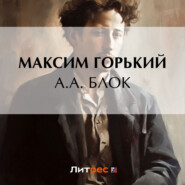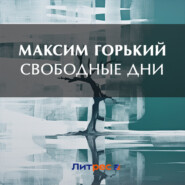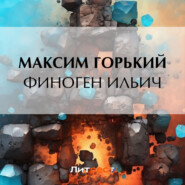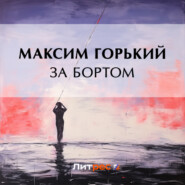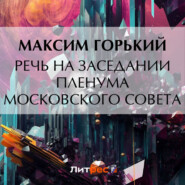По всем вопросам обращайтесь на: info@litportal.ru
(©) 2003-2025.
✖
Mother
Настройки чтения
Размер шрифта
Высота строк
Поля
"Here they are, the leaders!"
"We don't know who the leaders are!"
"Why, I didn't say anything wrong."
At another place some one in a yard shouted excitedly:
"The police will get them, and that'll be the end of them!"
"What if they do?" retorted another voice.
Farther on a crying woman's voice leaped frightened from the window to the street:
"Consider! Are you a single man, are you? They are bachelors and don't care!"
When they passed the house of Zosimov, the man without legs, who received a monthly allowance from the factory because of his mutilation, he stuck his head through the window and cried out:
"Pavel, you scoundrel, they'll wring your head off for your doings, you'll see!"
The mother trembled and stopped. The exclamation aroused in her a sharp sensation of anger. She looked up at the thick, bloated face of the cripple, and he hid himself, cursing. Then she quickened her pace, overtook her son, and tried not to fall behind again. He and Andrey seemed not to notice anything, not to hear the outcries that pursued them. They moved calmly, without haste, and talked loudly about commonplaces. They were stopped by Mironov, a modest, elderly man, respected by everybody for his clean, sober life.
"Not working either, Daniïl Ivanovich?" Pavel asked.
"My wife is going to be confined. Well, and such an exciting day, too," Mironov responded, staring fixedly at the comrades. He said to them in an undertone:
"Boys, I hear you're going to make an awful row – smash the superintendent's windows."
"Why, are we drunk?" exclaimed Pavel.
"We are simply going to march along the streets with flags, and sing songs," said the Little Russian. "You'll have a chance to hear our songs. They're our confession of faith."
"I know your confession of faith," said Mironov thoughtfully. "I read your papers. You, Nilovna," he exclaimed, smiling at the mother with knowing eyes, "are you going to revolt, too?"
"Well, even if it's only before death, I want to walk shoulder to shoulder with the truth."
"I declare!" said Mironov. "I guess they were telling the truth when they said you carried forbidden books to the factory."
"Who said so?" asked Pavel.
"Oh, people. Well, good-by! Behave yourselves!"
The mother laughed softly; she was pleased to hear that such things were said of her. Pavel smilingly turned to her:
"Oh, you'll get into prison, mother!"
"I don't mind," she murmured.
The sun rose higher, pouring warmth into the bracing freshness of the spring day. The clouds floated more slowly, their shadows grew thinner and more transparent, and crawled gently over the streets and roofs. The bright sunlight seemed to clean the village, to wipe the dust and dirt from the walls and the tedium from the faces. Everything assumed a more cheerful aspect; the voices sounded louder, drowning the far-off rumble and heavings of the factory machines.
Again, from all sides, from the windows and the yards, different words and voices, now uneasy and malicious, now thoughtful and gay, found their way to the mother's ears. But this time she felt a desire to retort, to thank, to explain, to participate in the strangely variegated life of the day.
Off a corner of the main thoroughfare, in a narrow by-street, a crowd of about a hundred people had gathered, and from its depths resounded Vyesovshchikov's voice:
"They squeeze our blood like juice from huckleberries." His words fell like hammer blows on the people.
"That's true!" the resonant cry rang out simultaneously from a number of throats.
"The boy is doing his best," said the Little Russian. "I'll go help him." He bent low and before Pavel had time to stop him he twisted his tall, flexible body into the crowd like a corkscrew into a cork, and soon his singing voice rang out:
"Comrades! They say there are various races on the earth – Jews and Germans, English and Tartars. But I don't believe it. There are only two nations, two irreconcilable tribes – the rich and the poor. People dress differently and speak differently; but look at the rich Frenchman, the rich German, or the rich Englishman, you'll see that they are all Tartars in the way they treat their workingman – a plague on them!"
A laugh broke out in the crowd.
"On the other hand, we can see the French workingmen, the Tartar workingmen, the Turkish workingmen, all lead the same dog's life, as we – we, the Russian workingmen."
More and more people joined the crowd; one after the other they thronged into the by-street, silent, stepping on tiptoe, and craning their necks. Andrey raised his voice:
"The workingmen of foreign countries have already learned this simple truth, and to-day, on this bright first of May, the foreign working people fraternize with one another. They quit their work, and go out into the streets to look at themselves, to take stock of their immense power. On this day, the workingmen out there throb with one heart; for all hearts are lighted with the consciousness of the might of the working people; all hearts beat with comradeship, each and every one of them is ready to lay down his life in the war for the happiness of all, for freedom and truth to all – comrades!"
"The police!" some one shouted.
CHAPTER XIX
From the main street four mounted policemen flourishing their knouts came riding into the by-street directly at the crowd.
"Disperse!"
"What sort of talking is going on?"
"Who's speaking?"
The people scowled, giving way to the horses unwillingly. Some climbed up on fences; raillery was heard here and there.
"They put pigs on horses; they grunt: 'Here we are, leaders, too!'" resounded a sonorous, provoking voice.
The Little Russian was left alone in the middle of the street; two horses shaking their manes pressed at him. He stepped aside, and at the same time the mother grasped his hand, pulling him away grumbling:
"You promised to stick to Pasha; and here you are running up against the edge of a knife all by yourself."
"I plead guilty," said the Little Russian, smiling at Pavel. "Ugh! What a force of police there is in the world!"
"All right," murmured the mother.
An alarming, crushing exhaustion came over her. It rose from within her and made her dizzy. There was a strange alternation of sadness and joy in her heart. She wished the afternoon whistle would sound.
They reached the square where the church stood. Around the church within the paling a thick crowd was sitting and standing. There were some five hundred gay youth and bustling women with children darting around the groups like butterflies. The crowd swung from side to side. The people raised their heads and looked into the distance in different directions, waiting impatiently.
"Mitenka!" softly vibrated a woman's voice. "Have pity on yourself!"












